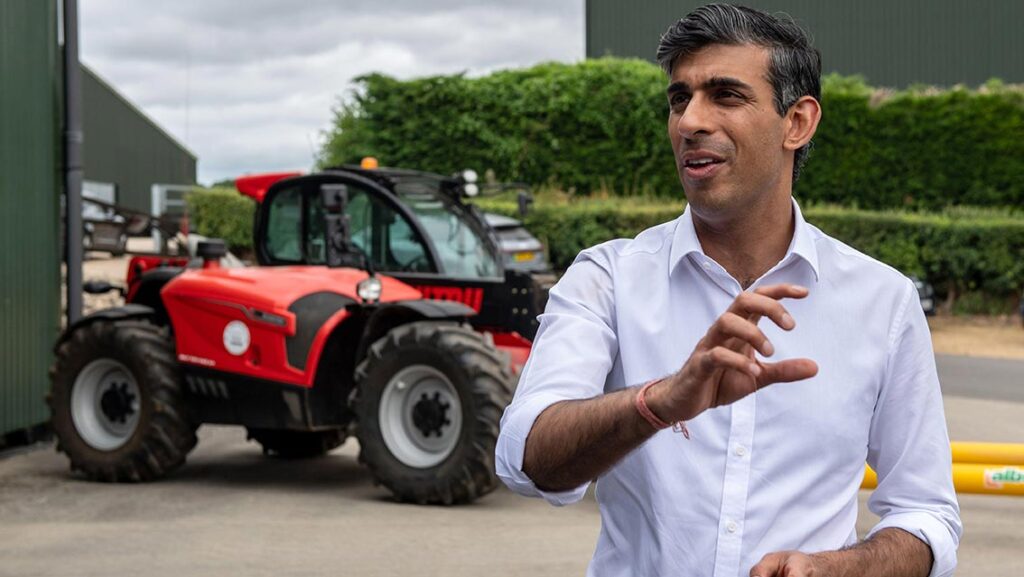What farmers want from Rishi Sunak’s government
 © Chris J Ratcliffe/PA Images/Alamy Stock Photo
© Chris J Ratcliffe/PA Images/Alamy Stock Photo British farmers are urging new prime minister Rishi Sunak to provide clarity on his future plans for agriculture, including domestic food production, the long-term budget and the Environmental Land Management (ELM) scheme.
In a remarkable turn of events, Mr Sunak was appointed as PM on Monday 24 October, replacing Liz Truss less than seven weeks after he lost to her in a leadership contest.
The 42-year-old former chancellor faced Labour leader Sir Keir Starmer at his first Prime Minister’s Questions as the new leader on Wednesday 26 October, during which he vowed “we will unequivocally back British farming and British farmers”.
See also: Therese Coffey returns to Defra amid calls for clarity on ELM
Mr Sunak was responding to comments from the MP for Clywd South, Simon Baines, who spoke of delight among his constituents that Welsh lamb will be sold in the US for the first time in 20 years.
The new PM has an uphill task to restore trust and faith from farmers after several weeks of political turmoil within the Conservative Party.
Mr Sunak has moved swiftly to build a new cabinet team around him, now that he is in office. Suella Braverman returns as home secretary – just six days after breaching the ministerial code.
The farming industry will be deeply concerned that Ms Braverman will seek to persuade Mr Sunak to drop Ms Truss’s plans to lift the cap on the Seasonal Worker Scheme for horticulture in 2023 (currently 40,000).
Mr Sunak has appointed Therese Coffey as Defra secretary. Ms Coffey, who served as a Defra minister from 2016 to 2019, takes over from Ranil Jayawardena, MP for North East Hampshire and a Truss ally who resigned after just 48 days in the role.
Spencer reappointed
Meanwhile, Defra has announced that Mark Spencer has been reappointed as farm minister. Mr Spencer, who is from a farming background, was previously chairman of the National Federation of Young Farmers’ Clubs.
Farming organisations have been quick to set out their priorities for Mr Sunak to ensure a viable and sustainable food and farming industry.
NFU president Minette Batters said she was looking forward to working with Ms Coffey and Mr Sunak on plans to grow the nation’s food production and support for farmers to produce more climate-friendly food for markets at home and overseas.
Mrs Batters said she would be seeking urgent clarity on the future of the ELM scheme to ensure farmers “can deliver a thriving food and farming sector, alongside and equal to continued environmental protection and enhancement”.
Other key NFU priorities include safeguards to ensure UK agriculture’s high animal welfare and environmental standards are not undermined by lower standard imports, support for horticulture and agriculture to fulfil its labour needs, and a regulation and planning system that allows farmers to invest in their businesses and boost productivity.
Farmer demands
Grassroots farmers have also outlined their key asks of Mr Sunak’s government.
Staffordshire dairy farmer David Brookes said the government must “send out the right signals” that it wants to invest in agricultural productivity.
“There needs to be serious investment in our farms to meet the productivity needs and demands that are coming down the line, not just little grant schemes. I do not think the government understands this,” he added.
“The majority of farms have not got the right funds for buildings and the banks don’t want to lend money to farmers. It is all right building HS2 and new housing, but if your belly is empty, it’s no good at all.”
But Martin Lines, a Cambridgeshire arable farmer and chairman of the Nature Farming Friendly Network, said the government must recognise farming for a lot more than just food production.
“I strongly believe UK agriculture has a great opportunity to be recognised for everything it can produce – from food security and nature recovery to green energy, public access and clean air.
“That’s the way we can get public and private finances for farming.”
New prime minister Rishi Sunak on farming
As the MP for Richmond (Yorkshire), a rural constituency, Rishi Sunak is acutely aware of the enormous challenges facing farmers.
In August, Mr Sunak tweeted farmers “are the lifeblood of the nation”, adding that: “As PM, I would make sure they are supported to underpin the food security that is important to us all”.
As he battled Liz Truss for the leadership of the Conservative Party, Mr Sunak told an NFU hustings event in August that he would fight for the interests of farmers and protect land to produce food.
“That means we have to take a different approach on solar farms, it means rewilding cannot come at the expense of food production when it is prime agricultural land, and we need to make sure policy reflects that,” he told delegates at the meeting in Stoneleigh, Warwickshire.
Mr Sunak, who campaigned for and supported Brexit, passionately believes that food production and protecting the environment “can and must go hand in hand”.
On farm labour, Mr Sunak told journalists afterwards he was “perfectly prepared” for the Seasonal Worker Scheme.
“As long as we are being tough on illegal migration and reforming our welfare system to get people off benefits and into work, I am very pragmatic about migration to support our economy,” he said.
Mr Sunak also promised to protect the interests of British farmers in any future trade negotiations.
